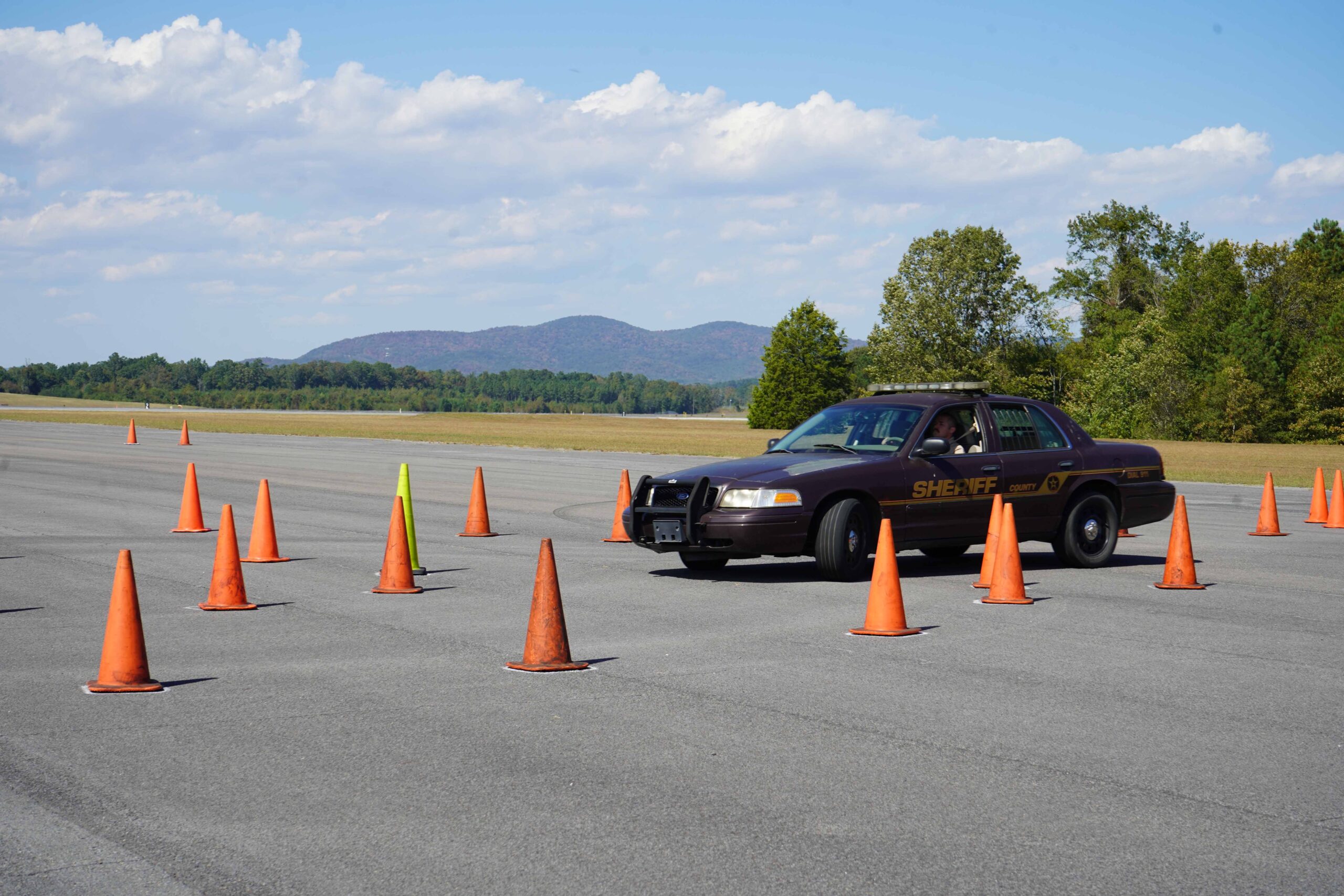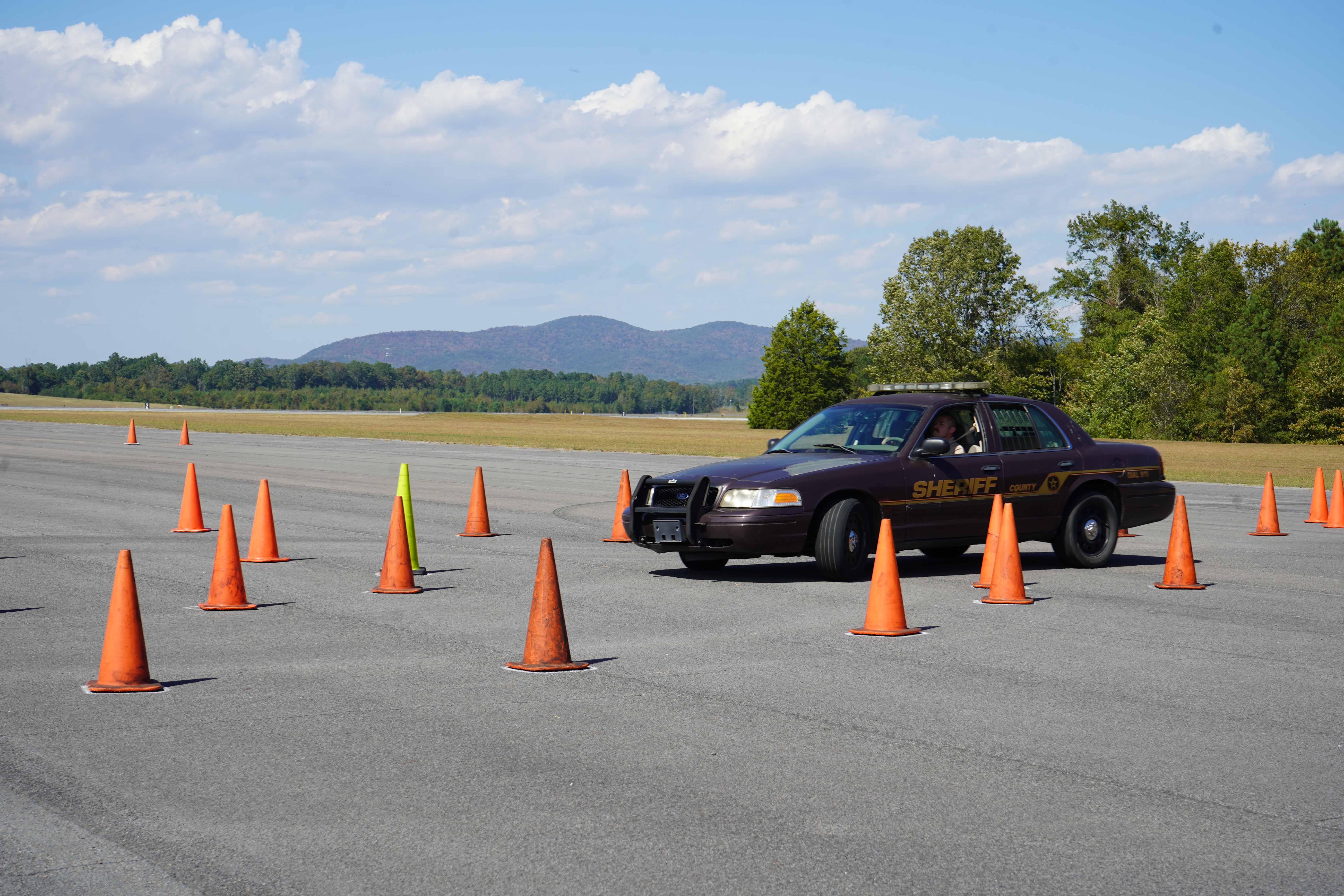
Georgia Northwestern Technical College’s (GNTC) Law Enforcement Academy prepares students for an exciting profession in one of Georgia’s high demand careers.
GNTC offers certificates for Basic POST (Georgia Peace Officer Standards and Training Council) Certification, Intermediate Law Enforcement and Advanced Law Enforcement at its Gordon County Campus in Calhoun. The program is also open to students who do not currently work in law enforcement. The academy offered its first class at GNTC in 2009.
“Professional law enforcement is critical,” said Jim Pledger, program director and instructor of the Law Enforcement Academy. “The better trained the officer, the more likely that officer will be a true guardian to the public and will be respected and trusted by the public.”
The primary objective of GNTC’s Law Enforcement Academy is training and certifying law enforcement officers, Pledger said.
“We cater to police and sheriff’s office cadets seeking POST Law Enforcement Certification, who are sponsored students, and students seeking certification on their own as pre-service,” Pledger said.
Basic POST Certification class runs for 11 weeks, Monday through Friday from 8 a.m. to 5 p.m. The hours required will increase from 408 hours to 810 hours effective Jan. 1, 2025, he said.
Classes include criminal law, community relations, firearms training, investigative skills, law enforcement procedures, traffic services and emergency vehicle operations. Credits earned in the program are transferable to GNTC’s Criminal Justice program.

“There is no typical day,” Pledger said. “Students may be in Rome on the driving course, spending the week on a firing range at one of our local agencies, interacting with a simulator, processing a crime scene, participating in live action scenarios or receiving lectures in the classroom.”
Intermediate Law Enforcement classes include advanced criminal procedure; First Responder training for law enforcement; health, wellness and stress management; officer survival and verbal judo. Advanced Law Enforcement classes include advanced firearms training, advanced traffic law, crime scene processing, interviews and interrogations, report writing, search warrants and affidavits and specialized patrol techniques.
The Walker County Sheriff’s Office sends all of its sponsored personnel that are already employed in the detention division to GNTC’s Law Enforcement Academy, and upon graduation they go back to sworn patrol positions, according to Walker County Sheriff Steve Wilson.
The Walker County Sherriff’s Office has employed a number of GNTC graduates over the years and currently has 10 employees who graduated from the academy, two of whom were pre-service, Wilson explained.
“The training that the students receive prepares them for real-world policing,” Wilson observed.
“The GNTC staff is very competent and knowledgeable with law enforcement experience,” Wilson said. “They are always ready to help in whatever way they can.”
Through GNTC Continuing Education, the academy also offers advanced training and certifications for the continued development of the law enforcement workforce.
“The classes we offer through Continuing Education provide an avenue for officers already in the field to learn specialties and earn certifications that increase opportunities for better salaries and promotions,” Pledger said, adding that the officers can do this without having to leave GNTC’s nine-county service area.
Through Continuing Education, the academy serves about 800 students and teaches about 2,200 training hours annually, he said.
The Law Enforcement Academy also develops training for agencies who wish to train on a particular subject and has periodically offered instructor training that awards state certification to allow individuals to instruct in general or specialty areas, such as General Instructor Training and Firearms Instructor Training.
GNTC’s Law Enforcement Academy faculty has a combined 90 years of experience in law enforcement. Pledger said he retired from service before beginning his career as an instructor with 25 years of law enforcement experience with a background in administration, executive supervision, patrol supervision and training. He has served as the academy’s director for 15 years.
Lt. Thomas Petty, Law Enforcement Academy instructor and Records, retired from service with 37 years of experience; a heavy concentration of his experience was in investigations and training. Capt. Gary McConathy, instructor and class coordinator of the academy, retired from service with 28 years of experience, with a background in traffic and traffic crash investigation, as well as administration, executive supervision and training.
“Becoming a POST-certified academy takes a lot of time and effort,” Pledger said. “The academy has a great reputation in the area. The more we reach out to the workforce, the better that reputation becomes, making GNTC and our Law Enforcement Academy more known and sought after.”
Pledger said he estimates at least 96% of GNTC’s Basic POST Certification graduates have a job before graduation.
The program attracts students because of the variety of career paths it offers and the potential for significant financial savings. Students may be eligible to have 100% of tuition costs paid by the HOPE Career Grant program because Basic POST Certification is classified as a high demand career in Georgia.
The academy has had or currently has graduates placed in nearly every law enforcement agency in GNTC’s nine-county service area, he said. Many graduates have also taken jobs in the Atlanta area, and others are employed by state agencies or college and university police departments.
Program graduates may also opt to become an arson investigator with a fire department. An arson investigator must be POST certified. Others may choose Corrections, emergency management or private security, as well as hospital security or other industry, he said.
Fabrice Sainton, program director and instructor of Logistics and Supply Chain Management at GNTC, worked 20 years as a French federal police officer. He said after moving to Georgia, he earned a POST certificate in November 2013 because law enforcement was his passion and area of expertise.
“GNTC’s program seemed like the best fit to help me transition my skills into the American law enforcement system, and I was living very close to the Gordon County Campus,” Sainton said. “The program was rigorous and required a lot of focus and dedication.”
Kayla Franks, a GNTC Police lieutenant, graduated with a Basic POST certification from GNTC in 2010. She said she chose GNTC because she could continue to work toward her Criminal Justice degree at another college while receiving POST certification while using HOPE and PELL grants to help pay for it.
“My ultimate career goal was to work in investigations,” Franks said. “Most departments require you to start as a law enforcement officer on patrol or in a detention center. I knew I would need to get POST certified first to achieve my goal.”
GNTC’s Law Enforcement Academy allowed her to get that certification to get started, she explained. She was then able to begin her career with a local agency and work her way through different departments within that agency.
Sainton faced the hurdle of learning a new technical language in English, which he characterized as “an uphill battle,” but he believes the training gave him a solid understanding of U.S. law enforcement framework.
“GNTC offers a great balance of practical training and academic study,” Sainton said. “The faculty really care about the success of their students, which makes a big difference.”
While laws and policies vary between states and departments, GNTC provides a solid foundation in the principles of law enforcement that would prepare an officer for most situations, Sainton stated.
“GNTC stands out for its strong program and exceptional staff. I highly recommend GNTC’s program, not just because of the curriculum but because of the amazing people who work at the academy,” he said.
“In 2013, the program allowed for credits to be transferred into the Criminal Justice program, which encouraged me to continue my education,” Sainton said. “I owe a great deal of gratitude to Jim Pledger and his instructors.”
Franks echoed that GNTC cares about students. She recommends the academy because its instructors bring so much experience and knowledge to the students. Instructors made course content relatable by sharing their good and bad experiences.
“The instructors are able to relate to the students because they have spent many years on the job,” Franks said. “Our instructors do a fantastic job at keeping up the standards for the academy, as well as going above and beyond so students don’t just get the ‘run of the mill’ police training.”
Through her classes at GNTC, Franks learned it was okay to ask questions when she got back to her agency. “I learned that if you aren’t willing to ask questions when you lack the knowledge, it can lead to detrimental decisions,” she said. “Law enforcement is an ever-changing field, and there will always be learning curves along the way.”
“I hope enough young people are taking the initiative to do something about what they see wrong in their communities,” Pledger said. He advises young people: “Don’t count on someone else to make positive change. Participate and be part of positive change.”


Bulloch Public Safety
04/30/2025 Booking Report for Bulloch County

Chattooga Local News
FIVE PEOPLE CHARGED WITH ANIMAL CRUELTY IN WALKER COUNTY

Chattooga Local News
Ishani Desai’s Path to Medical School Started with Volunteering

Chattooga Local Spotlight
From Chattooga to Command: Justin Rogers Takes New Role As Command Sergeant Major

Bulloch Public Safety
04/28/2025 Booking Report for Bulloch County

Bulloch Public Safety
04/15/2025 Booking Report for Bulloch County

Bulloch Public Safety
04/21/2025 Booking Report for Bulloch County

Bulloch Public Safety
04/11/2025 Booking Report for Bulloch County

Bulloch Public Safety
04/10/2025 Booking Report for Bulloch County











